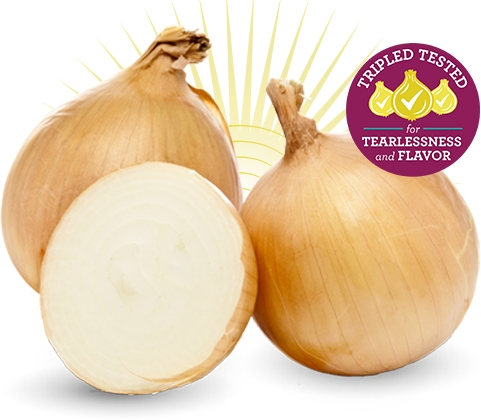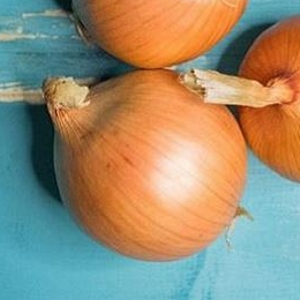It’s true. A group of farmers in America’s West have developed a truly tearless Onion and it’s already being grown in commercial quantities. This breakthrough may be as important to the culinary world as perfecting a perpetual motion machine would be to physics and the renewable energy sector…
 The Sunion tearless Onion looks and, they claim, tastes
The Sunion tearless Onion looks and, they claim, tastes
and cooks just like the old, teary ones…
They call it the Sunion, and it’s not the product of genetic engineering, as you might automatically think. In fact, it’s taken decades of natural cross-breeding to develop.
“This onion is the product of more than 30 years of research and development to grow an onion that actually decreased in pungency during storage,” Sunions breeder Rick Watson says, in a press release.
No other differences…
The Sunion is claimed to look, taste and cook up like any other cooking onion you’ve ever used. But it’s tear-producing components have been attenuated, and those that are left actually disappear over time.
The breeders say Sunions are sweet and full-flavoured – just what cooks want.
Where can I get some?
You can only get Sunions at a few select grocery stores in the U.S. northwest at the moment. But at least three big growers are ramping up production as fast as they can produce seeds. It may be a while before Sunions are available everywhere but they’re bound to be a big hit.
What about regular old Onions?
Will Sunions completely displace old, familiar, weepy, conventional onions in the marketplace?
I think that would take quite a while, if it ever happened at all. First, Sunions are bred for and grown in a relatively cool climate. Will they grow in all climates? We don’t know, yet. They were developed for a fairly wet climate. Will they grow where water is less abundant? Again , we don’t know.
My prediction is that, like greenhouse tomatoes and cucumbers, Sunions will probably find their market niche as premium-priced specialty items. It may take a very long time – perhaps another 30 years – for Sunions to propagate to the point where they are as common as conventional Onions. Until then, I suspect they will be marketed as curiosities, and priced accordingly.
Too bad.
But I cheer their arrival, nevertheless!
~ Maggie J.

